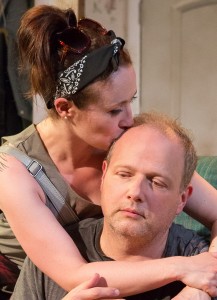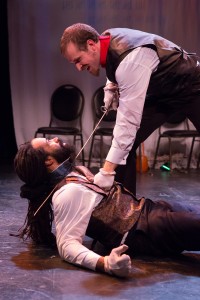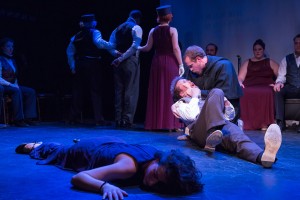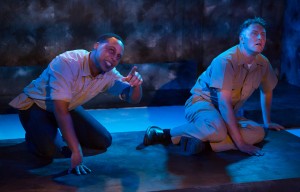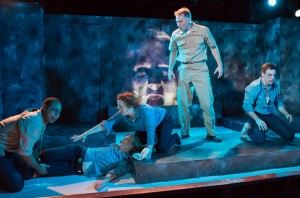It’s a minor theatrical annoyance, but one that does irk some critics: When your set displays a large wall clock, center stage, make sure it’s running. The wall clock in This Is Government, Nina Kissinger’s disappointing new comedy at 59E59, displays 4:55 in the 15-minute first scene and stays there, with the three denizens of Washington’s Cannon House Office Building moving the hands manually to tick off the subsequent scenes in a roughly seven-hour dramatic arc. It plays amateurishly, and so, unfortunately, does much of This Is Government.
This Is Not a Time of Peace
The personal is political. This familiar adage is one of the points Deb Margolin makes in the awkwardly staged and often pretentious-sounding play This Is Not a Time of Peace. Other points: History repeats itself. We are the sum total of everything we’ve experienced. Beware despots. Professional ambition can clash with personal ethics. Time does not heal everything. Trumpism equals McCarthyism.
The Greatest Hits Down Route 66
Histories come in all shapes and sizes and can be chronicled in any number of fashions. Family histories, each unhappy in their own way, may reveal personal pains that turn out to be strikingly universal. A country’s history can be told in terms of its politics, its geographic landmarks, its immigrants. And a people’s history can be reflected in its folk music. Any one of these might make for an engrossing night of theater. But when attempting to combine all three, finding the right balance and weaving a cohesive tale become a tall order. Such is the case with the New Light Theater Project’s production of The Greatest Hits Down Route 66, which finds itself short on songs, long on family dysfunction, and scattered on Americana.
The Lights Are On
In addition to crafting an engrossing thriller, dramatist Owen Panettieri shows a gift for prognostication with The Lights Are On. He wrote the play before the pandemic—it had been set for a fall opening in 2020 when COVID shut down all theater—yet it has a character who hoards toilet paper and face masks, wipes down the groceries and stays home all the time.
Everything Is Super Great
Stephen Brown’s Everything Is Super Great presents a group of likable, oddball, and somewhat hapless characters who don’t really fit in anywhere in the suburban Texas world they inhabit, but bond with one another amid unexpected circumstances. The word “great” works in the play as a form of deliberate denial, but also something genuinely hopeful: life is a series of vexations, large and small, for everyone on stage, and yet the characters, and the play itself, search for little moments of meaning and connection.
The American Tradition
The title of Ray Yamanouchi’s new play suggests there is only one American tradition. Is it fireworks on the Fourth of July? Is it celebrating Thanksgiving? Or is it putting out flags on Memorial Day? The walls at the 13th Street Theater hint that Yamanouchi’s view is much darker. There are posters for shows like A Darkey Misunderstanding and the musical Big Minstrel Jubilee by William H. West (1853–1902) and one that cautions “Negroes Beware: Do Not Attend Communist Meetings,” along with a 19th-century advertisement about the Democratic Party (the face of a white-bearded man) and the Republican party (a black man with unruly hair). More modern flyers hang there too: a picture of Angela Davis with the words “Black Power” and a recent Black Lives Matter poster.
Life x 3
Life x 3, Yasmina Reza’s high comedy about a dinner party gone seriously wrong, falls almost midway between her breakthrough hit Art (1994) and the equally acclaimed God of Carnage (2005). That may partly explain why this 2000 play has remained in the shadows, but on the surface it also seems a mere artistic exercise for the Iranian-born French playwright. As the title implies, Life x 3 examines the same evening from three different angles, but it also comments on its characters’ stresses and petty conflicts in relation to the universe. The excellent production is a welcome, if unusual, revival by the New Light Theater Project, which usually presents new plays.
The Hollower
Liza Birkenmeier’s The Hollower is the kind of play that tries to push the envelope in a variety of ways but ends up as effective as a pile of shredded paper. Perhaps that may be viewed as a tortured metaphor, but it’s nothing compared to the torturous path of what passes for plot in The Hollower. If you find yourself adrift after five minutes, you’ll be in full consternation when you leave.
Hal & Bee
As inspirations go, the combination of Who’s Afraid of Virginia Woolf? and The Secret Life of Walter Mitty is certainly an odd one, yet those sources are echoed in Max Baker’s charming, offbeat comedy Hal & Bee.
Sight Unseen
Donald Margulies, one of the most accomplished American playwrights, is probably less famous than he should be, in spite of a Pulitzer Prize for Dinner With Friends (2000) and notable achievements such as Collected Stories (1996) and Time Stands Still (2010). It’s unlikely that the shoestring production of Sight Unseen at the charming Access Theater will add significantly to his reputation, but an exceptional cast and astute direction make the quaint, four-flight walkup worthwhile for theater lovers. (An elevator is also available.)
(Un)Happy Family
Tolstoy said: “Happy families are all alike; every unhappy family is unhappy in its own way.” The origins of unhappiness are certainly a unique combination for every family. For the one in Ann Adams’s Strange Country, directed by Jay Stull at the Access Theater, mental illness, lack of loyalty, and addiction are the sources that lead to complications between siblings.
The play opens on a one-room efficiency apartment: beer cans, leftover foods and trash are strewn everywhere. The occupant, Darryl (Sidney Williams), is fast asleep on the couch, until his sister, Tiffany (Vanessa Vache), lets herself in. After she puts food in the refrigerator, she assesses the situation and wakes him up by spraying him with Fabreze. Roused from his sleep, Darryl cries: “That shit will give you cancer!” The irony of the line is not lost on Tiffany. Darryl is a slob who seems completely unconcerned with his personal hygiene, the cleanliness of his apartment, or his health. He even confesses that he medicates himself on a steady stream of beer and meds.
Tiffany gently tosses back an ironic barb of her own: “Maybe you’ll eat your dinner one day, rather than drink it.” As Tiffany bangs around the apartment trying to clean up, she orders her brother to go wash up so they can go to their mother’s re-commitment ceremony. This brings on a stalemate.
Tiffany seems abrasive and angry, but underneath her volatile outbursts and no-nonsense demeanor is a woman who really cares about her family. If she didn’t care so much, she wouldn’t spend her morning goading Darryl and trying to do what’s best for her family. This concern extends to her girlfriend, Jamie (Bethany Geraghty), who is stony-faced and avoids eye contact with Darryl. She seems highly displeased with the situation.
At one point in the play, which moves along organically even though the dialogue is a bit stultified in places, Darryl and Jamie find themselves alone in Darryl’s apartment. Darryl is thrilled to discover they are both trying to move forward while simultaneously being moored by addiction. He practically whoops: “You’re the first person who’s made me feel good about myself” and “You’re more fucked-up than me!”
While Tiffany tries hard to keep the family together, Darryl steadily consumes beer. As he opens one can after another, the sound of the initial pop of the tab, and then the fizz of the beer become a soundtrack for his character. Nonetheless, Darryl is like the idiot savant, or the fool in Shakespeare’s plays. For all his slovenly drunkenness, he has wisdom and insight. He’s right on when he says plaintively to Tiffany: “The whole of your life is trying to fix people who don’t want to be fixed. But you cling to it.” He knows her life’s purpose is to stay close to her family and try to keep them together, but he can’t help and doesn’t want to.
Strange Country does a good job of capturing the sadness that is brought on when a family member is suffering from a problem that is too difficult to fix. However, it also explores the complicated idea that what may be good for one person may not be good for another. Everyone has his own way of surviving, and the measures people use may not always be the right ones. For Darryl, this is his way of surviving; it’s his “normal.” Tiffany has another “normal,” a more conventional and socially acceptable one. But she doesn’t seem happy. Although Darryl seems less productive and more destructive, he seems more content with his life and himself. It’s a philosophical conundrum.
Strange Country by Anne Adams, produced by New Light Theater Project, runs until Aug. 13 at 8 p.m. Wednesday–Saturdays at Access Theater(380 Broadway at White Street, in Tribeca). Tickets are $15 in advance, $18 at the door, and can be purchased online at: http://www.newlighttheaterproject.com.
Not Just Another Sandwich...
Currently playing at Urban Stages is the latest adaptation and world premiere of Monte Cristo by Jared Reinmuth based on The Count of Monte Cristo by Alexandre Dumas. An extraordinary cast of 13 who rarely, if ever, leave the stage deliver betrayal, lust, greed, power, and most of all, revenge. The director, Cailin Heffernan, utilizing a small space, keenly chose to keep the actors on stage as witnesses to each scene, as well as part of the scene. Ever present and always attentive, the actors pose, mimic and mime the action, create sound effects, and play musical instruments, including Spanish guitar and a drum called a djembe, while awaiting their turns in Dantes’ game of revenge chess. All these elements make the main dialogue even more compelling.
The story of Dumas’ 1844 classic is a familiar one. On the eve of Dantes’ (Tom Frank) wedding to young Mercédès (Kate Kenney), he is betrayed by three friends who devise a plot that labels him a betrayer of the crown. Imprisoned for 14 years, Dantes learns of the treasure of Monte Cristo, escapes from his captors, finds the treasure and returns to society taking on the persona of Count Monte Cristo. With wealth supporting him, he exacts revenge on his three false friends—one of whom, Mondego (Carsey Walker Jr.) has married Mercédès; they have one son, Albert (Brett Benowitz).
The plot takes place in the prison at Chateau d’If, in Rome during Carnival, and lastly, in Paris. What ties this current production by New Light Theater Project together so well, besides the multitalented cast, is original music by Henry Aronson, the film visuals created by Dedalus 7 projected onto the backdrop, dialect coaching from Theresa McElwee and superb fight direction by Dan Renkin. The lighting, by Michael O’Connor, is subtle and moody, bringing to life the simple yet creative set design by Sarah Lambert. Etched into the side walls are hash marks to count the number of days Dantes is in prison along with the phrase, “My God, let me keep my memory!”
Costume design by Cheryl McCarron consists of floor length dresses for the women, each in a different hue, while the men sport brocade vests with colored cravats. Monte Cristo is in a three-piece contemporary tux with a red cravat, which appears a little out of keeping with the period, but he wears it well. McCarron enhanced the costuming with colorful feathered masks for the Carnival in Rome, white gloves for the Parisian cocktail party and rough-hewn shawls for the men in prison. Overall, the costuming is extremely appealing.
Heffernan has molded her actors into an effective ensemble. Keeping track of the characters, each playing multiple roles with different accents, is challenging to watch at times, making it difficult to single out any actor. As a large, tight ensemble piece, each actor plays very well off the other as scenes meld seamlessly from one to another. The subtleties required to not just be present to what is happening center stage but to enhance it with sound effects and mime makes each actor an integral participant.
Frank’s portrayal as Monte Cristo is charismatic and engaging even as he manipulates his betrayers Fernand (Carsey Walker Jr.), Danglars (Vinnie Penna) and Villefort (Paul Sheehan). The young Mercédès, Kate Kenney, is bright and radiant. In an unusual scene at the wedding ceremony, Kenney dances with Mondego and they include Alana Barrett-Adkins, who then is "handed off" to portray the married Mercédès. Delivering rich performances are Liliane Klein as Mme Danglars and Margherita Peluso who played Mme de Villefort and La Carconte.
From the opening processional to the final shot, this is a vibrant production with a dedicated and talented cast. Revenge, in any century, may be sweet; however, the ensemble of Monte Cristo is rich with talent and proves it.
The New Light Theater Project's production of Monte Cristo runs through Feb. 13 at Urban Stages (259 West 30th St. between 7th and 8th Aves.) in Manhattan. performances are Thursday-Saturday at 8 p.m. Tickets range from $10-$15 and can be purchased by calling 630-632-1459 or visiting BrownPaperTickets.com.
Nightmare on the High Seas
If art is about digging beneath the surfaces of things and restoring wholeness to human experience, run to see In The Soundless Awe, an important new play by Jayme McGhan and Andy Pederson now playing at Access Theater until Dec. 12. One of three plays in repertory with the New Light Theater Project (NLTP), it is beautifully produced and imaginatively directed by Sarah Norris, a founding artistic director of the NLTP company.
At the heart of the play is Captain Charles Butler McVay III, a highly decorated third generation Navy officer and the commander of the U.S.S. Indianapolis when two Japanese torpedoes struck it just after midnight on July 30, 1945. Three hundred men were killed in the first 12 minutes it took the ship to sink. Over the next five days, 900 more languished unsheltered on the high seas fighting sun, sharks, dehydration, starvation and exhaustion while anticipating rescue any minute. Three SOS signals had been sent as the ship went down but 600 more men would die before survivors were accidentally sighted by pilots on a routine patrol and rescued. It was the largest loss of life in U.S. naval history. McVay was court-martialed and found guilty of “failing to zigzag,” a way of steering to avoid enemy fire, although this maneuver was technically at the discretion of the commanding officer (himself).
How does one plumb such an experience: five days, 900 men and the mothers, fathers, wives and children forever caught in its vast net? This might have been a play about a Navy cover-up: its failure to provide standard destroyer escort for the ship (although six days earlier a destroyer was similarly torpedoed on the same route); and its mangled rescue operation that inexcusably left 900 men in the cold Pacific waters for five interminable days. But In The Soundless Awe is less about events—a sinking, court martial and suicide—than about an experience that is simply beyond the ability of the mind to grasp. What do we do with such an experience? What does it look like? What are its consequences for the survivors? For the families of those who did not survive? And for our navy and military, which in deflecting blame to one of its own, set the stage, the writers imply, for cover-ups to come in Vietnam and elsewhere. For us?
This is a deftly written and ambitious script that zigzags back and forth in real-time, in remembered time and in imagined time not so much as a way to tell us a story as to imitate the flow of mind itself in its perpetual return to the frozen moment, to the five days on the high seas which will forever imprison those who lived through it. On stage the bodies of the actors freeze and unfreeze as they play out the bits and pieces of this terrible scene: attempts of the Captain and his crew to distract themselves, delusions of help on a horizon, sharing the little water they had, discovering that a mate has lost a leg to a shark, the dying of the men one by one. A suggestive and repeating motif, the Gray Lady (Hallie Wage), a beautiful and tempting siren of death and release, pulls the dying off stage but also dances with McVay. The Captain imagines a meeting with his stern and distant father and plays cards with friends years after his court martial, but his mind always returns to those five days on the water until he steps out of time itself by raising a gun to his head.
The actors work in a theatrical style in which choreographed movement and gesture, video, lighting and sound matter as much as, or even more, than the words spoken. A stage direction includes a note: “nightmarish and Kafkaesque,” but so much more in the production is not in the script—the eerie blue light that bathes the stage when we first enter the theater; video clips noting each day on the water and how many men are still living. Phantasmagoria and metaphor are the keys to the excavation of the inner world of McVay, but also to a shared human interior. The creative direction of Norris and her brilliant creative and production team deepen the script and give the play its juice and strange beauty. The ensemble, who take on a variety of roles, are outstanding. The two actors who play McVay as a young man and as an old man, Chris Kipiniak and Leo Farley, are convincing.
In The Soundless Awe is a well-executed, well-conceived and beautifully produced play. What makes it important is that it enlarges the violated human dimension of a terrible event in our shared American history. It opens our hearts and imagination to the wartime experience of men who sacrificed for our common welfare.
In Soundless Awe” runs until Dec. 12 at Access Theater (380 Broadway, 4th Floor, between White and Walker Sts.) in lower Manhattan. Performances run Thursday-Saturday at 8 p.m. Check NewLightTheaterProject.com for the exact schedule. Tickets are $15 and can be purchased by calling 800-838-3006 or visiting BrownPaperTickets.com. Limited blocks of free and discount tickets for veterans or active-duty personnel are available. Inquire at NewLightTheaterProject@gmail.com.
















